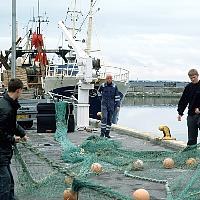(BRUSSELS) – The EU Commission outlined Thursday its proposals for next year’s fishing opportunities in the Baltic Sea, on which EU countries will determine how much fish can be caught in the sea basin.
The Commission proposes to increase fishing opportunities for herring in the Gulf of Riga, whilst maintaining the current levels for sprat, plaice and by-catches of eastern cod. The Commission proposes to decrease fishing opportunities for the remaining stocks covered by the proposal, in order to improve the sustainability of those stocks and to help other stocks such as cod and herring recovering.
“The poor environmental status of the Baltic Sea is heavily affecting our local fishermen and women, who rely on healthy fish stocks for their livelihoods,” said fisheries Commisisoner Virginijus Sinkevicius: “This is why the Commission is doing its utmost to restore those stocks, and today’s proposal is a reflection of that ambition. However, the state of the Baltic Sea is not only related to fishing, so everyone must do their part to build the long-term sustainability of this precious sea basin.”
Over the past decade, EU’s fishermen and women, industry and public authorities have made major efforts to rebuild fish stocks in the Baltic Sea. Where complete scientific advice was available, fishing opportunities had already been set in line with the principle of maximum sustainable yield (MSY) for seven out of eight stocks, covering 95% of fish landings in volume. However, in 2019 scientists discovered that the situation was worse than previously estimated. Decisive action is still necessary to restore all stocks and ensure that they grow to or remain at sustainable levels.
The proposed total allowable catches (TACs) are based on the best available peer-reviewed scientific advice from the International Council on the Exploration of the Seas (ICES) and follow the Baltic multiannual management plan adopted in 2016 by the European Parliament and the Council. As regards western Baltic cod, western Baltic herring and salmon, the Commission will update its proposal once the relevant scientific advice will be available (expected by mid-September).
Commission proposal for fishing opportunities in the Baltic Sea for 2022 - background guide



